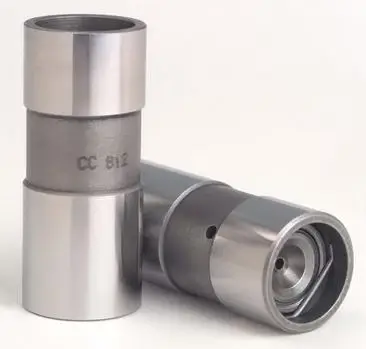Fix engine lifter ticking noise
Why engine lifters tick and what you can do about it
The most common cause of engine ticking noise is from noisy hydraulic lifters. Lifters can make a ticking noise if the lifter is worn, starved for oil due to a clogged oil port, gummed up with varnish or sludge, or the lifter is out of adjustment or the push rod is worn or bent.
What is lifter tick?
It’s the noise made when there’s excess clearance between the push rod and lifter, lifter and rocker or push rod and rocker arm.
How a hydraulic lifter works
Engine oil pressure fills the hydraulic lifter through one  of the oil galleries in the block or head (depending on whether the engine is overhead valve (OHV) or overhead cam (OHC)). In an OHV engine, the camshaft lobe pushes up on the base of the lifter. The lifter body pushes up on the oil and inner plunger and cap, which moves the plunger up, exerting upward force on the push rod.
of the oil galleries in the block or head (depending on whether the engine is overhead valve (OHV) or overhead cam (OHC)). In an OHV engine, the camshaft lobe pushes up on the base of the lifter. The lifter body pushes up on the oil and inner plunger and cap, which moves the plunger up, exerting upward force on the push rod.
In an OHC system, the camshaft lobe pushes down on the bucket lifter, which moves the plunger and cap against the valve stem, opening the valve.
What cause lifter tick?
Lifter wear
Lifters have moving parts and they can wear if you don’t change your oil on time. The wear causes excessive clearances which prevents the lifter from maintaining the correct amount of pressure, which prevent it from exerting the proper upward/downward force on either the push rod or valve stem.
Lifter tick due to wear cannot be fixed with any chemical treatments.
Lifter varnish or sludge buildup
Lifters operate in a high heat range which can cause motor oil to oxidize and break down into a varnish like substance that “gums” up the moving parts of the lifter. In those cases, chemical treatments can often dissolve the buildup and restore normal operation and stop lifter tick noise.
Low oil pressure
Lifters must be constantly refilled with oil. Engines with low oil pressure can develop all kinds of noises, including lifter tick. So your first step in checking for lifter tick is to check oil level and oil pressure. If either are off, take corrective measures before proceeding.
Lifters Out of adjustment
When new lifters are installed, a special procedure is used to adjust the lifters with the engine running. If don’t improperly, the lifters can make noise.
Valve clearance adjustments not done
Some engines don’t use self-adjusting hydraulic lifters and instead require occasional valve clearance adjustments. If the valve stems and rocker arms develop wear, they will create noise similar to lifter tick.
How to fix lifter noise
Chemical treatments to quiet noisy lifters
Many companies sell chemical treatments to fix lifter noise. These treatments work to dissolve and remove varnish and sludge buildup in the lifter itself, the oil port in the lifter and the oil passages.
The treatments are usually a combination of a cleaning agent and very light oil. In many cases, they’re nothing more than automatic transmission fluid and detergent.
In some cases the treatments are to be left in for the entire oil change, while other treatments are to be drained out with the oil after running for a specified period of time or until the lifter tick noise stops.
Valve clearance adjustment
Car owners assume their engine never need valve clearance adjustments. Not true. Some engines require occasional valve adjustments. Refer to your owner’s maintenance guide for adjustment recommendations. In many cases, a simple valve adjustment can eliminate valve noise.
Lifter replacement
In extreme cases, the lifters must be replaced and that often requires replacing the camshaft, push rods and rocker arms as well. However, that’s extreme fix is usually due to owner neglect.
©, 2023 Rick Muscoplat
